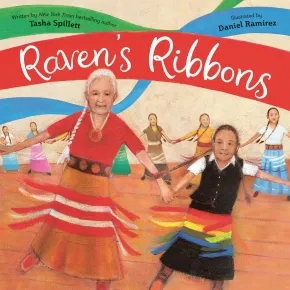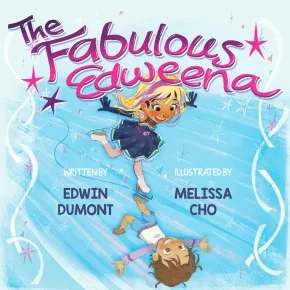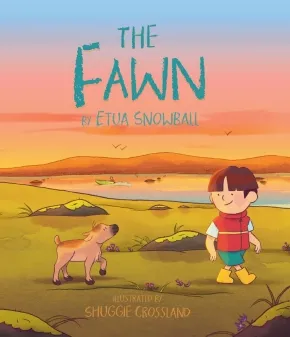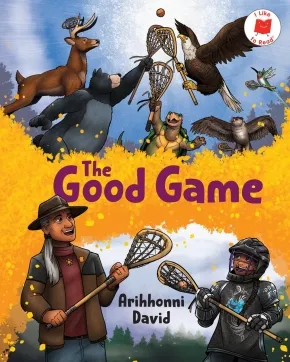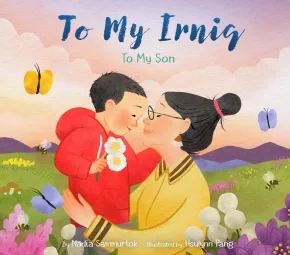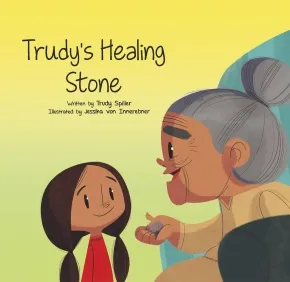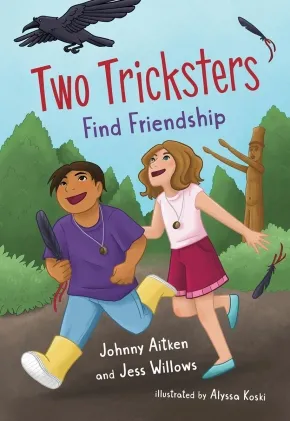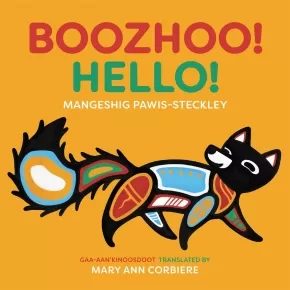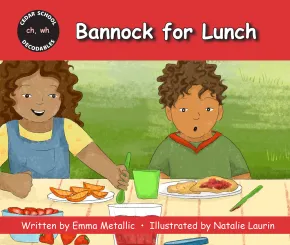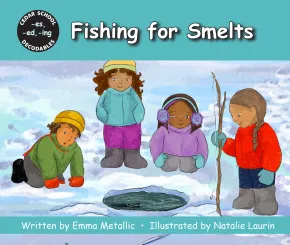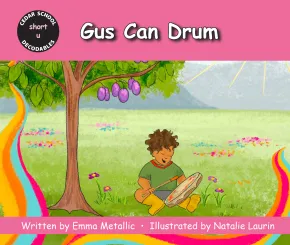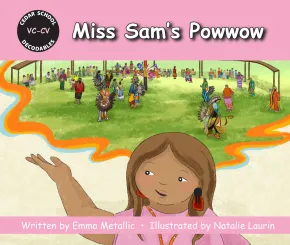
English Language Arts
16
-
30
of
214 Results;
Sort By
Go To
of 15
Raven's Ribbons
$22.95
Artists:
Format:
Hardcover
Text Content Territories:
Indigenous Canadian;
ISBN / Barcode: 9781771475662
Synopsis:
Synopsis:
A joyous celebration of gender expression through an Indigenous lens, by New York Times bestselling author Tasha Spillett and Ojibwe elder Daniel Ramirez
Raven loves round dances. The drums sing to the people, and the people dance to their songs. Raven especially loves dancing with his grandma, sidestepping to the rhythm of the drums. His favourite part of all is watching the ribbon skirts swirl like rainbows.
"Nohkum, do you think a boy could wear a ribbon skirt?" Raven asks his grandmother one day. She tells him she has lived for a long time, but she has never seen it. That evening, she sews late into the night, and Raven awakes to a rainbow skirt of his own. "I've lived for a long time," his grandma says, "and I'm lucky to see beautiful things that I've never seen before." At the next dance, Raven wears the swirl of unique ribbons with pride.
With illustrations infused with joy and colour, this moving intergenerational story celebrates self-expression, honouring traditions, and finding room for reinvention.
Reviews
"Weaves Two-Spirit self-expression and collective belonging into a beautiful tribute to Indigenous heritage." — Kirkus Reviews - STARRED REVIEW
"Cree author Spillett (I Sang You Down from the Stars) captures the joy of the round dance, and a feeling of belonging and connection offered in intergenerational Indigenous community." — Publishers Weekly - STARRED REVIEW
"[A] welcome story about an Indigenous child's gender expression." — The Horn Book
"In this heartfelt story, Spillett shows that love and support matter more than tradition, gently challenging expectations while honouring culture." - Debra H., Elementary School Teacher, Indigenous Books for Schools
Educator Information
Recommended for ages 4 to 7.
This title is included in the Indigenous Books for Schools database from the Association of Book Publishers of BC. It is recommended for Grades 2 to 4 for English Language Arts, Art, Dance, Music, and Social Studies.
Additional Information
32 pages | 9.00" x 9.00" | Hardcover
The Fabulous Edweena
$21.95
Artists:
Format:
Hardcover
Text Content Territories:
Indigenous Canadian; First Nations; Anishinaabeg; Ojibway;
ISBN / Barcode: 9781772604047
Synopsis:
Synopsis:
Edwin loves his sister Patsy's closet. He adores dresses and earrings and boots with high heels. And when he's finished getting dressed, Edwin is transformed...into the fabulous Edweena!
Today is the figure skating competition at school and Edwin has decided to compete as Edweena. What will people say when they meet her for the first time? Can a boy in drag win the competition? Edweena will have to give her best performance ever to find out!
Educator Information
Recommended for ages 6 to 8.
This books available in English and Anishinaabemowin (Ojibwe): Omaamakaadendaagozi Edwiina / The Fabulous Edweena
This title is included in the Indigenous Books for Schools database from the Association of Book Publishers of BC. It is recommended for Grades 1 to 3 for English Language Arts and Physical and Health Education.
Additional Information
24 pages | 8.50" x 8.50" | Hardcover
The Fawn
$22.95
Artists:
Format:
Hardcover
Text Content Territories:
Indigenous Canadian; Inuit;
ISBN / Barcode: 9781772275223
Synopsis:
Synopsis:
In a surprising and heart-warming story, Etua Snowball shares his childhood experience of meeting and befriending a baby caribou.
After a chance encounter with a herd of caribou, a fawn follows a young boy back to his cabin. The boy and fawn spend the summer together exploring the northern landscape, picking berries, and swimming in the lake. Then one day the boy and fawn get an unexpected visitor, and the boy must learn how to say goodbye to his furry friend.
Reviews
"Through vivid storytelling and Shuggie Crossland’s expressive illustrations, The Fawn deepens cultural understanding and offers insight into Inuit ways of life and resilience. The book supports the BC curriculum by exploring how local environments shape identity and ways of living and encourages discussions on kindness, responsibility, and our relationship with nature. A glossary and pronunciation guide for Inuktitut words is included." - Shannon D., Elementary & Middle School Teacher, Indigenous Books for Schools
Educator & Series Information
Recommended for ages 6 to 8.
This book is part of the My Wild Arctic Friends series.
This book is included in the Indigenous Books for Schools database from the Association of Book Publishers of BC as a recommended resource for K to 3 for the following subjects: English Language Arts, Science, and Social Studies.
Additional Information
28 pages | 8.00" x 9.00" | Hardcover
The Game
$23.95
Artists:
Format:
Hardcover
Text Content Territories:
Indigenous Canadian; First Nations; Salish; Coast Salish; Musqueam;
ISBN / Barcode: 9781778401756
Synopsis:
Synopsis:
A beautifully illustrated reimagining of the origins of hockey from an Indigenous lens.
Killer Whale and Brown Bear are arguing: Brown Bear says he can beat Killer Whale at any challenge, yet Killer Whale disagrees. When Powerful Mena overhears their bickering, he comes up with a solution: a game on the ice, played with sticks, nets, and a star for a puck. But who will win and earn the trophy?
For kids aged 4-8, The Game features:
- An introduction to Musqueam language and culture
- Beautiful watercolor artwork from a celebrated Haida artist
- Detailed backmatter and a pronunciation guide
With poetic text by gifted Indigenous storyteller Henry Charles (Ten Bears), an elder of the Musqueam First Nation, and breathtaking illustrations by Haida artist, Shoshannah Greene, The Game offers a vibrant introduction to Musqueam language and culture and inspires readers to rediscover a sport we know and love.
Reviews
"This book is written in English with some words in hən̓q̓əmin̓əm̓. It begins with an introduction of the author, Henry Charles (Ten Bears), as the book was published posthumously. The story imagines hockey in the long ago; Mən’ə decided that a game played on ice was the only way for Killer Whale and Brown Bear to settle their dispute. Mən’ə made a trophy for the winner, but when Killer Whale wins, he declines the trophy as he is heading back to the ocean. The reward is then shared with a boy who invited others to witness the game, and he shares it with his people. Students can learn about important traditional practices (witnessing, inviting others to witness, and the use of a game to settle a dispute) through the story. Older students could use the story to learn about sportsmanship and review the characteristics of fair play." - Alethea S., Elementary School Teacher, Indigenous Books for Schools
Educator Information
Recommended for ages 4 to 8.
This title is included in the Indigenous Books for Schools database from the Association of Book Publishers of BC. It's recommended for K to 4 classrooms for English Language Arts and Physical and Health Education.
Additional Information
48 pages | 10.00" x 8.00" | Hardcover
The Good Game (PB)
$12.49
Format:
Paperback
Text Content Territories:
Indigenous;
ISBN / Barcode: 9780823460809
Synopsis:
Synopsis:
How can the small mouse and squirrel play lacrosse with the big animals? A fun Native American tale that first graders can read on their own.
A game of lacrosse is about to begin—with the four-legged animals facing off against the winged animals. Mouse and Squirrel want to join!
But Bear and Deer won’t let animals so small on their team. The birds would welcome the small animals, but Mouse and Squirrel can't fly. The winged team has a clever plan.
This Native American tale about the origin of the bat and flying squirrel is framed by a grandfather sharing a story with his grandson.
Educator & Series Information
Phonics features are noted on the copyright page.
This book has been officially leveled by using the F & P Text Level Gradient(TM) Leveling System. It is a Level I for Grade 1.
The award-winning I Like to Read® series focuses on books for kindergarteners and first graders. Acclaimed author-illustrators create original, high-quality illustrations that support comprehension of simple text and are fun for kids to read again and again with their parents, teachers or on their own!
A Junior Library Guild Gold Standard Selection!
Educator Information
Recommended for ages 4 to 8.
Additional Information
32 pages | 7.77" x 9.99" | Paperback
To My Irniq: To My Son
$22.95
Artists:
Format:
Hardcover
Text Content Territories:
Indigenous Canadian; Inuit;
Grade Levels: Preschool; Kindergarten;
ISBN / Barcode: 9781772275599
Synopsis:
Synopsis:
This tenderly told follow-up to the acclaimed To My Panik: To My Daughter highlights the unique beauty of a mother-son bond. In this lovingly told book, a mother recounts for her son all the things she loves about him, connecting each attribute to an element of the Arctic landscape or Inuit traditional life. Her son is strong, like a polar bear carrying its cubs across the frozen sea. He is gentle, like a delicate blade of cottongrass. He’s as steadfast as the spark that lights the campfire, and as invigorating as a sip of icy river water. This beautiful narrative of connection and love will warm the hearts of all readers.
Reviews
"This tender story, told in a poetic question-and-response structure, celebrates the bond between a mother and child and between an Inuit family and the Arctic landscape. Ideal for shared reading in K–1 classrooms, the story invites connections to seasonal cycles while encouraging personal reflections on strength, gentleness, integrity, compassion, and humour. The illustrator’s use of soft textures and muted tones contributes to the emotional tone of the story. In English Language Arts, it supports vocabulary development and oral language comprehension. In Science, it can prompt comparisons between Arctic and British Columbian flora and fauna. In Arts Education, Pang’s use of space and perspective to express scale can be explored through watercolour or pastel art techniques." - Bonny-Lynn D., Elementary School Teacher, Indigenous Books for Schools
Educator Information
Recommended for ages 3 to 5.
This title is included in the Indigenous Books for Schools database from the Association of Book Publishers of BC as a recommended resource for kindergarten and Grade 1 for the following subjects: English Language Arts, Art, Science, and Social Studies.
Additional Information
28 pages | 9.50" x 8.50" | Hardcover
Trudy's Healing Stone (PB)
$10.95
Artists:
Format:
Paperback
Text Content Territories:
Indigenous Canadian; First Nations; Gitxsan (Gitksan);
ISBN / Barcode: 9781778540691
Synopsis:
Synopsis:
Everyone gets sad, angry, frustrated and disappointed. Difficult emotions are a natural part of life. In this book, Trudy's Healing Stone, Trudy Spiller shares a special teaching about a practice that anyone can use to help them process their feelings with the help of Mother Earth.
Educator Information
Recommended for ages 4-6
This rhyming book is an adaptation of Trudy’s Rock Story for a younger audience (ages 4-6).
A few Gitxsan words and how to say them are included at the end of the book.
This book is also available in French: Le caillou de guérison de Trudy.
Recommended in the Canadian Indigenous Books for Schools 2020/2021 resource list for Grades Pre-K to 1 for English Language Arts.
Additional Information
28 pages | 7.87" x 7.09" | Paperback
Two Tricksters Find Friendship
$8.95
Format:
Paperback
Text Content Territories:
Indigenous Canadian; First Nations; Salish; Coast Salish;
ISBN / Barcode: 9781459839281
Synopsis:
Synopsis:
Friendship can overcome any obstacle.
To Jessie and Johnny, their friendship is easy.
Jessie and Johnny have been inseparable ever since Jessie moved to the small island town during summer break. But as they begin fourth grade together, the new school year gets off to a rocky start when outside pressures and differences in their home lives threaten their friendship. Jessie lives comfortably and never worries about money while Johnny lives with his father and stepmother on the reserve outside of town. With guidance from Raven and spiritual teacher, Steven, the two friends bridge the gaps between them and learn to lean on each other through family troubles and cultural differences.
Reviews
"From the first paragraph, I was hooked. This is a beautiful story about friendship, family and community. The characters take us on adventures of discovering the connection to land, animals and history. Their friendship helps us understand how we care for each other on this journey of truth and reconciliation. My new favorite book!”— Monique Gray Smith, award-winning author of My Heart Fills With Happiness
“Set in the peace of a rural coastal community, this thoughtful and inspiring book creates space not just for playful adventure but reflection, curiosity and learning. Young Jessie and Johnny demonstrate the power of true friendship to bridge cultural difference, and their story shows us that wisdom comes from many kinds of teachers—the land, trickster Raven, Elders and, importantly, one another. Well-paced and charmingly illustrated, this book draws you into a beautiful world among trees and berry bushes, at the beach and the Bighouse, and it teaches that approaching each other with openness, support and respect allows for the discovery of many gifts.”— Amy Reiswig, reviewer, writer, editor
"This story blends Indigenous Knowledge and perspectives with themes of diversity and cultural teachings, making it a meaningful read-aloud for elementary classrooms or a thoughtful addition to a beginning reader’s library." - Debra H., Elementary School Teacher, Indigenous Books for Schools
Educator & Series Information
Recommended for ages 6 to 8.
This book is part of the Orca Echoes series.
Key features:
- Two friends face the fourth grade together while learning to overcome cultural prejudices. Reconciliation is exemplified by a friendship between a non-Indigenous child and an Indigenous child.
- The authors use fictional versions of their younger selves to reimagine what it would be like if they met as children today.
- Extended family are shown as key supporters for Johnny and Jessie, and positive relationships with a grandmother, aunties, and a cousin are depicted.
- Coast Salish culture is celebrated by author Johnny Aitken’s own experiences and teachings.
- An Indigenous character, who identifies as 2Spirit, acts as a role model and educator to the two friends.
Reading Levels:
Fountas & Pinnell Text Level Gradient: R
Lexile measure: 720L
Guided Reading Level: R
This book is available in French: Johnny et Jessie reçoivent un message de Corbeau.
This title is included in the Indigenous Books for Schools database from the Association of Book Publishers of BC. It is recommended for Grades 2 to 5 for English Language Arts, Physical and Health Education, and Social Studies.
Additional Information
96 pages | 5.25" x 7.62" | Paperback
Boozhoo! / Hello!
$21.99
Format:
Hardcover
Text Content Territories:
Indigenous Canadian; First Nations; Anishinaabeg; Wasauksing First Nation;
ISBN / Barcode: 9781773067155
Synopsis:
Synopsis:
Hello! Who do you see and hear in the woods today? Meet a variety of woodland and water animals in this story written in Anishinaabemowin and English.
Can you see a fox digging, spot two minnows dancing or hear a swarm of bees buzzing? Boozhoo! / Hello! introduces children to familiar animals as they go about their daily activities: walking, running, swimming, climbing and finally - when the day is done - sleeping! Illustrated in a vibrant and colorful woodland style that will appeal to readers young and old alike, and accompanied by an author's note.
Awards
- 2025 PMC Indigenous Literature Award Winner
Educator Information
Recommended for ages 3 to 6.
Dual-Language: Anishinaabemowin and English.
Translated by Mary Ann Corbiere.
Key Text Features: Author's note, translations, illustrations
Correlates to the Common Core State Standards in English Language Arts:
CCSS.ELA-LITERACY.RL.1.3
Describe characters, settings, and major events in a story, using key details.
CCSS.ELA-LITERACY.RL.1.7
Use illustrations and details in a story to describe its characters, setting, or events.
Additional Information
32 pages | 8.75" x 8.75" | Hardcover
Cedar School Decodables: Bannock for Lunch
 $7.99
$7.99

Artists:
Format:
Paperback
Text Content Territories:
Indigenous Canadian; First Nations; Mi'kmaq (Mi'gmaq); Listuguj Mi'gmaq First Nation;
Grade Levels: Kindergarten; 1;
ISBN / Barcode: 9781771746427
Synopsis:
Synopsis:
In this story, the class enjoys a picnic lunch. They eat bannock, jam, and other tasty foods.
Bannock is a type of bread that is important to Mi’gmaq. Bannock is often eaten with jam or butter.
What is your favourite lunch food?
Educator Information
Recommended for ages 4-7, for use in kindergarten and Grade 1 classrooms.
Cedar School Decodables is divided into six sets, which increase in word count and complexity of sentence structure. Bannock for Lunch is in Set 2 – Digraphs, and reviews ch and wh. Books in Set 2 have 60-80 words.
Readers should be familiar with the concepts included in Set 1 and Set 2:
- consonants
- beginning and end blends
- short vowels
- digraphs
- a /o/
- s – /s/ and /z/
- -s suffix
Series Information
Welcome to Cedar School! Join Liv, Tom, Gus, and Bell as they learn on the land and explore Mi’gmaw teachings with their teacher, Miss Sam, and the school’s Mi’gmaw Elder, Jen. With charming illustrations and simple storylines, this decodable series engages students as they practise their reading skills. Each book includes a pre-reading review of non-decodable words, and many of the books introduce special words related to Indigenous teachings. Talking Together prompts facilitate discussions led by the reading teacher.
Developed in partnership with Dyslexia Canada, Cedar School Decodables is a series of 20 decodable books for young readers. Designed for students who have previously learned short vowel and consonant sounds, additional phonic skills are developed progressively throughout the series.
The series will be accompanied by Cedar School Decodables Teacher’s Guide and a series of four picture books, which will be available at a later date.
This book is included in the Indigenous Books for Schools database from the Association of Book Publishers of BC. It is recommended for K to 2 classrooms for English Language Arts and Social Studies.
Additional Information
16 pages | 6.5” x 5.5” | Paperback | ISBN: 9781771746427
Cedar School Decodables: Elder Jen’s Story
 $7.99
$7.99

Artists:
Format:
Paperback
Text Content Territories:
Indigenous Canadian; First Nations; Mi'kmaq (Mi'gmaq); Listuguj Mi'gmaq First Nation;
Grade Levels: Kindergarten; 1;
ISBN / Barcode: 9781771746540
Synopsis:
Synopsis:
In this story, it is the National Day for Truth and Reconciliation. Jen shares her story of healing with the students.
For a long time, Mi’gmaq were not allowed to speak their language at school. Today, many Mi’gmaq are reconnecting with their language.
How do you honour the National Day for Truth and Reconciliation?
Educator Information
Recommended for ages 4-7, for use in kindergarten and Grade 1 classrooms.
Cedar School Decodables is divided into six sets, which increase in word count and complexity of sentence structure. Elder Jen’s Story is in Set 6 – R-Controlled Vowels, and reviews er, ir, and ur. Books in Set 6 have 110-125 words.
Readers should be familiar with the concepts included in Set 1 to Set 6:
- consonants
- beginning and end blends
- short, long, and r-controlled vowels
- digraphs
- suffixes and ending spelling patterns
- a /o/
- s – /s/ and /z/
- VC-CV, V/CV, VC/V, and compound words
- possessives
This book is included in the Indigenous Books for Schools database from the Association of Book Publishers of BC. It is recommended for K to 2 classrooms for English Language Arts and Social Studies.
Series Information
Welcome to Cedar School! Join Liv, Tom, Gus, and Bell as they learn on the land and explore Mi’gmaw teachings with their teacher, Miss Sam, and the school’s Mi’gmaw Elder, Jen. With charming illustrations and simple storylines, this decodable series engages students as they practise their reading skills. Each book includes a pre-reading review of non-decodable words, and many of the books introduce special words related to Indigenous teachings. Talking Together prompts facilitate discussions led by the reading teacher.
Developed in partnership with Dyslexia Canada, Cedar School Decodables is a series of 20 decodable books for young readers. Designed for students who have previously learned short vowel and consonant sounds, additional phonic skills are developed progressively throughout the series.
The series will be accompanied by Cedar School Decodables Teacher’s Guide and a series of four picture books, which will be available at a later date.
Additional Information
16 pages | 6.5” x 5.5” | Paperback | ISBN: 9781771746540
Cedar School Decodables: Fishing for Smelts
$7.99
Grade Levels: Kindergarten; 1;
ISBN / Barcode: 9781771746472
Synopsis:
Synopsis:
In this story, Log Pond has frozen over, and the class is ice fishing! Bell sings a song for good luck. Will the class catch anything?
Mi’gmaq go ice fishing in the winter. Traditionally, they used sticks as fishing rods.
Have you ever gone ice fishing?
Educator Information
Recommended for ages 4-7, for use in kindergarten and Grade 1 classrooms.
Cedar School Decodables is divided into six sets, which increase in word count and complexity of sentence structure. Fishing for Smelts is in Set 4 – Longer Words, and reviews -es, -ed (/d/, /t/, and /ǝd/), and -ing. Books in Set 4 have 90-100 words.
Readers should be familiar with the concepts included in Set 1 to Set 4:
- consonants
- beginning and end blends
- short and long vowels
- digraphs
- a /o/
- s – /s/ and /z/
- -s, -es, -ed, and -ing suffixes
- VC-CV, V/CV, VC/V, and compound words
- possessives
This book is included in the Indigenous Books for Schools database from the Association of Book Publishers of BC. It is recommended for K to 2 classrooms for English Language Arts and Social Studies.
Series Information
Welcome to Cedar School! Join Liv, Tom, Gus, and Bell as they learn on the land and explore Mi’gmaw teachings with their teacher, Miss Sam, and the school’s Mi’gmaw Elder, Jen. With charming illustrations and simple storylines, this decodable series engages students as they practise their reading skills. Each book includes a pre-reading review of non-decodable words, and many of the books introduce special words related to Indigenous teachings. Talking Together prompts facilitate discussions led by the reading teacher.
Developed in partnership with Dyslexia Canada, Cedar School Decodables is a series of 20 decodable books for young readers. Designed for students who have previously learned short vowel and consonant sounds, additional phonic skills are developed progressively throughout the series.
The series will be accompanied by Cedar School Decodables Teacher’s Guide and a series of four picture books, which will be available at a later date.
Additional Information
16 pages | 6.5” x 5.5” | Paperback | ISBN: 9781771746472
Cedar School Decodables: Gus Can Drum
 $7.99
$7.99

Artists:
Format:
Paperback
Text Content Territories:
Indigenous Canadian; First Nations; Mi'kmaq (Mi'gmaq); Listuguj Mi'gmaq First Nation;
Grade Levels: Kindergarten; 1;
ISBN / Barcode: 9781771746380
Synopsis:
Synopsis:
In this story, Gus learns to drum. He drums to the sun and his favourite animals.
Mi’gmaq use moose hide to make drums. Drumming is medicine to Mi’gmaq. The drum sounds like the beat of Mother Earth’s heart.
Have you ever played a drum?
Educator Information
Recommended for ages 4-7, for use in kindergarten and Grade 1 classrooms.
Cedar School Decodables is divided into six sets, which increase in word count and complexity of sentence structure. Gus Can Drum is in Set 1 – Short Vowels, and reviews short u. Books in Set 1 have 40-60 words.
Readers should be familiar with the concepts included in Set 1:
- consonants
- beginning and end blends
- short vowels
- s – /s/ and /z/
- -s suffix
Series Information
Welcome to Cedar School! Join Liv, Tom, Gus, and Bell as they learn on the land and explore Mi’gmaw teachings with their teacher, Miss Sam, and the school’s Mi’gmaw Elder, Jen. With charming illustrations and simple storylines, this decodable series engages students as they practise their reading skills. Each book includes a pre-reading review of non-decodable words, and many of the books introduce special words related to Indigenous teachings. Talking Together prompts facilitate discussions led by the reading teacher.
Developed in partnership with Dyslexia Canada, Cedar School Decodables is a series of 20 decodable books for young readers. Designed for students who have previously learned short vowel and consonant sounds, additional phonic skills are developed progressively throughout the series.
The series will be accompanied by Cedar School Decodables Teacher’s Guide and a series of four picture books, which will be available at a later date.
This book is included in the Indigenous Books for Schools database from the Association of Book Publishers of BC. It is recommended for K to 1 classrooms for English Language Arts and Social Studies.
Additional Information
16 pages | 6.5” x 5.5” | Paperback | ISBN: 9781771746380
Cedar School Decodables: Miss Sam’s Powwow
 $7.99
$7.99

Artists:
Format:
Paperback
Text Content Territories:
Indigenous Canadian; First Nations; Mi'kmaq (Mi'gmaq); Listuguj Mi'gmaq First Nation;
Grade Levels: Kindergarten; 1;
ISBN / Barcode: 9781771746489
Synopsis:
Synopsis:
In this story, Miss Sam talks to the class about powwows. Miss Sam has danced at powwows since she was a child.
Mi’gmaq gather with their community to dance and sing at powwows. This is also a time for healing and prayers.
What celebrations do you go to?
Educator Information
Recommended for ages 4-7, for use in kindergarten and Grade 1 classrooms.
Cedar School Decodables is divided into six sets, which increase in word count and complexity of sentence structure. Miss Sam’s Powwow is in Set 4 – Longer Words, and reviews closed/closed syllable words and compound words. Books in Set 4 have 90-100 words.
Readers should be familiar with the concepts included in Set 1 to Set 4:
- consonants
- beginning and end blends
- short and long vowels
- digraphs
- a /o/
- s – /s/ and /z/
- -s, -es, -ed, and -ing suffixes
- VC-CV, V/CV, VC/V, and compound words
- possessives
Series Information
Welcome to Cedar School! Join Liv, Tom, Gus, and Bell as they learn on the land and explore Mi’gmaw teachings with their teacher, Miss Sam, and the school’s Mi’gmaw Elder, Jen. With charming illustrations and simple storylines, this decodable series engages students as they practise their reading skills. Each book includes a pre-reading review of non-decodable words, and many of the books introduce special words related to Indigenous teachings. Talking Together prompts facilitate discussions led by the reading teacher.
Developed in partnership with Dyslexia Canada, Cedar School Decodables is a series of 20 decodable books for young readers. Designed for students who have previously learned short vowel and consonant sounds, additional phonic skills are developed progressively throughout the series.
The series will be accompanied by Cedar School Decodables Teacher’s Guide and a series of four picture books, which will be available at a later date.
This book is included in the Indigenous Books for Schools database from the Association of Book Publishers of BC. It is recommended for K to 2 classrooms for English Language Arts and Social Studies.
Additional Information
16 pages | 6.5” x 5.5” | Paperback | ISBN: 9781771746489
Cedar School Decodables: Sap!
 $7.99
$7.99

Artists:
Format:
Paperback
Text Content Territories:
Indigenous Canadian; First Nations; Mi'kmaq (Mi'gmaq); Listuguj Mi'gmaq First Nation;
Grade Levels: Kindergarten; 1;
ISBN / Barcode: 9781771746359
Synopsis:
Synopsis:
In this story, Tom and Liv learn how to collect sap from maple trees. Back at school, Miss Sam heats the sap, and it turns into maple syrup!
Mi’gmaq use maple syrup to sweeten their foods and as medicine.
Have you ever tasted maple syrup?
Educator Information
Recommended for ages 4-7, for use in kindergarten and Grade 1 classrooms.
Cedar School Decodables is divided into six sets, which increase in word count and complexity of sentence structure. Sap! is in Set 1 – Short Vowels, and reviews short a and nasalized a. Books in Set 1 have 40-60 words.
Readers should be familiar with the concepts included in Set 1:
- consonants
- beginning and end blends
- short vowels
- s – /s/ and /z/
- -s suffix
Series Information
Welcome to Cedar School! Join Liv, Tom, Gus, and Bell as they learn on the land and explore Mi’gmaw teachings with their teacher, Miss Sam, and the school’s Mi’gmaw Elder, Jen. With charming illustrations and simple storylines, this decodable series engages students as they practise their reading skills. Each book includes a pre-reading review of non-decodable words, and many of the books introduce special words related to Indigenous teachings. Talking Together prompts facilitate discussions led by the reading teacher.
Developed in partnership with Dyslexia Canada, Cedar School Decodables is a series of 20 decodable books for young readers. Designed for students who have previously learned short vowel and consonant sounds, additional phonic skills are developed progressively throughout the series.
The series will be accompanied by Cedar School Decodables Teacher’s Guide and a series of four picture books, which will be available at a later date.
This book is included in the Indigenous Books for Schools database from the Association of Book Publishers of BC. It is recommended for K to 1 classrooms for English Language Arts and Social Studies.
Additional Information
16 pages | 6.5” x 5.5” | Paperback | ISBN: 9781771746359
Sort By
Go To
of 15

